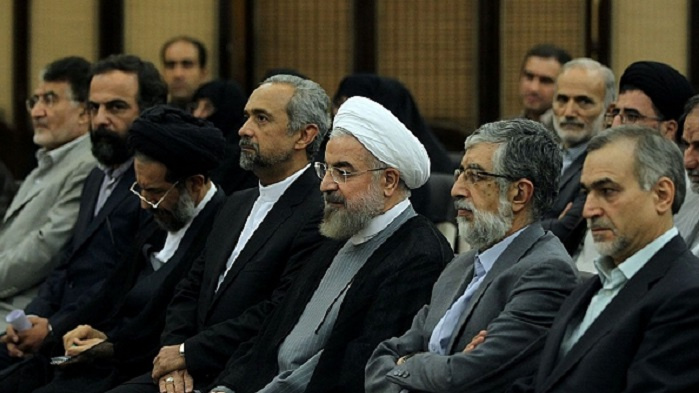Will Principlists Trust Rouhani Once Again?

After the spokesman for the Society of Combatant Clerics Gholamreza Mesbahi Moghaddam and a number of other prominent Principlists raised the possibility that the front would back Hassan Rouhani for his expected bid to reelection, ex-deputy speaker of the parliament Mohammadreza Bahonar said the Principlists would support President Rouhani with certain conditions. Morteza Nabavi, a member of the central council of the Islamic Coalition Party, has also hailed Rouhani’s achievements, saying he will be easily reelected and the Principlists are better off investing in the city councils' elections. In the meantime, the Principlist media outlets are spreading rumors that the Reformists are considering a post-Rouhani transition. Almost all Reformists however stress that Rouhani is their option for the next presidential race.
Fararu website has conducted an interview with Nasser Imani, a Principlist domestic politics expert on Rouhani’s status in the Principlist camp.
“The Principlists have several candidates for the presidential race and naturally want to introduce them and see them as the victor. Given a number of factors, including the administration’s [weak] performance, they hope to win. Thus, I do not see how Rouhani can win an easy reelection in 2017, when he took office in 2013 with only 51 percent of the total ballots,” Imani told Fararu.
Justifying his views, he notes that in both cases of former presidents Hashemi Rafsanjani and Mohammad Khatami, the Principlists did not involve themselves in the second elections because the incumbent presidents' reelection was quite likely, but this is not the case with Hassan Rouhani.
Answering a question on why his fellow Principlists are putting forward the possibility that they could support Rouhani, he said Rouhani would certainly refuse the conditions Bahonar has brought up.
When asked to name some of the presidential hopefuls from the Principlist camp that have the potential to compete with Rouhani, Imani declined to provide names but said there are a remarkable number of individuals among the Principlists whose experience in executive jobs is no less than Rouhani.
He pointed out two prerequisites that pave the way for the Principlists to compete with Rouhani in the upcoming race. According to Imani, the first important factor is the existence of a potential candidate capable of defeating the sitting president. A second factor is the possibility of the latter’s defeat, which is, as Imani believes, quite high as far as Rouhani is concerned.
“So as the Principlists see such possibilities, they will be ready to pay the price and introduce candidates to compete with Rouhani,” Imani added. However, he did not negate the existence of a chance that the Principlists be left with options such as backing Rouhani with certain conditions or withdraw in a blackout.
Fararu asks if the Principlists prefer that the Reformists shifted away from Rouhani so that the Principlist could back Rouhani more conveniently, introducing him as their own representative. “The Principlists are in no good terms with Rouhani and even if the Reformists shift away from him, the Principlists finds him as a political opportunist that immigrated from Principlism to Reformism. So he will never be assimilated into the Principlist camp again,” Imani replied. “From the Principlists’ point of view, Rouhani is finished and they will never trust him regardless of his reelection because he is not a reliable person party-wise,” he added.
Imani went on to recap Rouhani’s presidency as a Trojan horse used by the Reformist to enter the establishment. “The Reformists do not view Rouhani as one of their own at all, but in a certain, they had no one better in order to break into the citadel. Therefore, neither the Reformists nor the Principlists will back him,” he reiterated.
When asked to comment on the question whether Rouhani is a political opportunist or his shift was a result of intellectual evolution, as has been the case with many of today’s Reformists who thought differently at the beginning of the Islamic Revolution, he provided some corrections. “The Left in Iran did not undergo an intellectual evolution but an intellectual metamorphosis after the first decade of the revolution,” he said. “The whole left was a quite radical, anti-imperialist faction, similar in their behavior with the Communist left. However, after the first decade of the revolution, they underwent a total shift in essence that should not be called an intellectual evolution,” Imani added.
“The rightists, accused of ‘American-style Islam’ [in the 1980s], still possess the same characteristics with no change while the leftists who used to call themselves adherents of ‘Islam for the underprivileged’ have lost resemblance with their past and have undergone a complete intellectual transformation,” he concluded.
* This piece was originally published in Fararu, a moderate website affiliated with Tehran’s mayor Mohammad-Bagher Ghalibaf.

